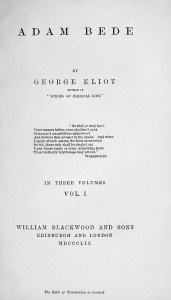
The Classics Club spin landed on number five which means I will be reading Adam Bede by George Eliot. This was the first novel she wrote, published pseudonymously in 1859 at a time when, as Mary Ann Evans, she was a highly respected scholar. Its merit was recognised immediately though not unanimously. An anonymous review in The Athenaeum in 1859 praised it as a “novel of the highest class,” and The Times called it “a first-rate novel. Henry James however was irritated by the narrator’s interventions and many critics have accused Eliot of concluding the novel in a way that undermined the moral lessons learned by her main characters.
The novel follows four characters’ rural lives in the fictional community of Hayslope—a rural, pastoral and close-knit community in 1799. The plot revolves around a love “rectangle” among beautiful but self-absorbed Hetty Sorrel; Captain Arthur Donnithorne, the young squire who seduces her; Adam Bede, her unacknowledged suitor; and Dinah Morris, Hetty’s cousin, a fervent, virtuous and beautiful Methodist lay preacher.
When I read this the first time, many years ago, I enjoyed it simply as a good story and sympathised particularly with Adam, the loyal intelligent carpenter and man of integrity. At that time I wasn’t aware of Eliot’s theory that authors should extend their sympathies to all their characters, a theory she put into practice in Middlemarch where the narrator makes us realise that even the distasteful Casubon has his inner doubts and feelings. I’m going to read Adam Bede with an eye to whether she had already began to use this notion in her early work.
